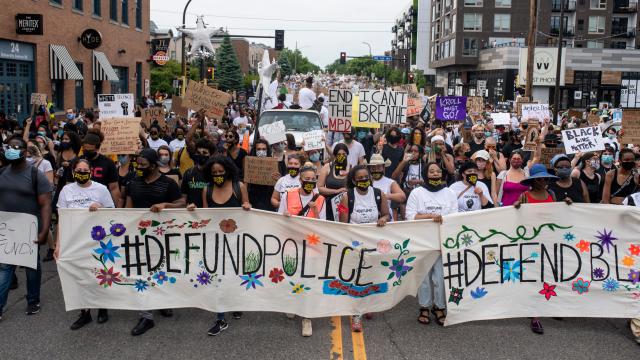As cities are making big pledges for police reform, the viral #8CantWait campaign has become city officials’ go-to atonement manual. When Campaign Zero launched it on June 3rd, they initially made the striking claim that the proposed set of eight policies could reduce police killings by 72 per cent, by, among other action items, banning chokeholds, requiring a warning before shooting, and requiring that officers report all uses of force. Celebrities and politicians quickly ran with the idea, and cities have embraced it. But today, Human Rights Watch warned that the trendy campaign could dangerously enable police brutality, serving a bit of flashy window dressing for departments which have no intention to rebuild from the ground up. Certainly not to be demolished altogether.
“The #8CantWait policing program is so superficial as to be meaningless,” John Raphling, criminal legal system researcher for Human Rights Watch, said in a press release. “It allows mayors and police chiefs to say they’re doing something without actually making the changes that are needed.” Raphling calls such a campaign a “dangerous distraction” and “empty words.” To that point, the Mayor of Tampa boasted last week that the city’s police department already follows #8CantWait’s policies on the same day the Tampa Bay Times reported that police attacked largely peaceful protesters with smoke, gas, and non-lethal bullets.
“I haven’t seen specific campaigns like this that have generated this type of attention,” Raphling told Gizmodo via email. “But, it fits a pattern of distracting from more fundamental reforms by offering superficial changes. For example, changing the wording of the standard from ‘reasonable’ to ‘necessary,’ (California AB 392) doesn’t really change police behaviour, just what they have to say to justify their actions.” Last year, following a rash of police shootings of unarmed citizens, California passed the Act to Save Lives, which raised the legal justification for deadly force to “only when necessary in defence of human life.”
“And,” Raphling added, “they end up getting more money for funding to understand those changes.”
Human Rights Watch points out that #8CantWait has no enforcement mechanisms, saying that “the campaign’s marketing relies on questionable data analysis.” They direct readers to a post by prominent activists Cherrell Brown and Philip V. McHarris, who argue that the 2016 study behind #8CantWait’s proposals draws from an insufficient pool of departments, with data spanning an unacceptably brief timeframe (18 months), including the time of Ferguson-sparked protests, which likely skewed results. All of this, they say, makes the study far too weak to support the campaign’s bold claim that its adoption will reduce police killings by 72 per cent. The campaign has since removed that figure from its graphics.
“One of the most harmful effects of the campaign,” Brown and McHarris write, “is that it re-legitimises the police by implying that these reforms can drastically reduce police killings and reform departments when people are pushing for transformative change that will truly end police violence.”
There is abundant evidence that police will invent their own interpretations of the proposals’ language, or simply hurt people and lie about it. Human Rights Watch points to #8CantWait’s proposed “use of force continuum,” a mandate that would align degrees of force with the extremity of the situation. As HRW has found in a 216-page study, the Tulsa, Oklahoma Police Department has such a policy but then bakes in an exception for “fluid situations,” in which officers can use their own judgment — which, HRW writes, has granted wide leeway for police to attack civilians with tasers, batons, dog bites, and pepper-ball launchers. They add that Minneapolis has four #8CantWait requirements, including a duty to intervene in excessive force. It didn’t prevent three officers from mercilessly pinning George Floyd to the ground while Derek Chauvin murdered him. And while the officers involved in that case have been criminally charged for their various roles, there’s no way to know whether that would be the case without a massive public outcry, and there’s no guarantee they’ll be convicted.
Campaign Zero hasn’t retracted the #8CantWait campaign, but they’ve posted a large disclaimer to the #8CantWait homepage, writing that “even with the best of intentions, the #8CANTWAIT campaign unintentionally detracted from efforts of fellow organisers invested in paradigmatic shifts that are newly possible in this moment. For this, we apologise wholeheartedly, and without reservation.” They still believe that implementation of #8CantWait policies are “useful steps,” but advise supporters to advocate for defunding and abolition.
In a list of resources, they link to 8toAbolition, which pointedly rejects the #8CantWait premise. “The end goal of these reforms is not to create better, friendlier, or more community-oriented police or prisons,” they write. “Instead, we hope to build toward a society without police or prisons, where communities are equipped to provide for their safety and well being.” Human Rights Watch doesn’t explicitly advocate for abolition, but it has long committed to putting funds toward uplifting low-income communities rather than giving police limitless money and literal get-out-of-jail-free cards to terrorize them.
